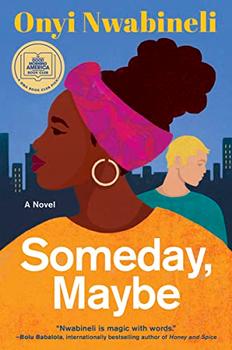Summary | Excerpt | Reading Guide | Reviews | Beyond the Book | Readalikes | Genres & Themes | Author Bio

A Novel
by Onyi Nwabineli
Gloria is worse.
She begins by trying to tempt me from my stupor with tales from the world of corporate law, salacious office gossip I would have eaten up pre-tragedy. When this fails, she segues seamlessly into emotional blackmail: "Your niece and nephew miss you, Eve. So do I. Say something. Ma and Dad don't know what to do." Her final attempt involves simply talking to me as if I am a responsive and eager participant in the conversation. She will have read this online somewhere—regale the partner of the deceased with distracting and jovial anecdotes; make sure the partner of the deceased understands he or she is needed and loved.
Gloria's intelligence, temerity and inability to tolerate bullshit have brought her all her successes in life: as a lawyer, as a wife and as a mother. Failing so consistently to bring a smile to my face must be a terrible blow to her ego. But grief destroys. A wrecking ball that crushes your ability to enjoy. She has, I reason when the guilt nibbles at me, a living husband and perfect kids. She will be fine. The jury is still out on my own chances.
* * *
Quentin is gone and this, his persistent absence, should be the worst thing about losing a spouse. But—treat of treats—I have the added bonus of a searing, unabating, viselike guilt, a result of failing to notice he was in danger of being lost. So I lean on medicinal support like a crutch. And because the world insists on continuing to turn even though your grief necessitates it pause, if only temporarily, eventually, inevitably and despite your best efforts at avoidance, Aspen finds a way in. She arrives on a night when the pain of lying in a half-occupied bed has become too much and I am roaming the house in darkness.
Quentin's ghost stalks me on these nights. I glimpse him disappearing around corners, hear his chuckle bouncing off the high ceilings. He refuses, however, to speak to me, which is rich considering how all this is his doing. I follow him past the second-floor hall window that looks down onto the street and see a car idling by the curb. It is two twenty-six in the morning, and despite Battersea's gentrification, another chunk of London being consumed by froufrou coffee shops and new builds, I know none of our neighbors owns a Bentley.
Aspen.
I have been ignoring her calls for days, but something compels me to go down to her. Maybe it is because she has never been here before and I want her to see that this house is real, a place her son loved. Maybe it is because her unanswered calls have brought her to my doorstep and I want to look at her face and see whether she, too, is drowning, undone by grief. Most likely it is because nobody is there to stop me.
Outside, my bare soles move silently against the pavement. The cold snakes its way inside my clothes and underneath my skin. Aspen rolls down the rear window as I approach. Her face is half in darkness. I examine her profile. But it isn't like I am in her presence enough to determine whether she has undergone any drastic transformation. I, on the other hand, look and feel like I have been turned inside out; the person I was no longer exists.
Aspen being Aspen does not let me speak. She does not even look at me. Her voice is tired but hard.
"You've been ignoring me," she says.
"I—Aspen, what are you doing here?" The cold has worked its way up from my feet and is wrapped around my ankles, anchoring me to the spot.
"Quentin was not a man who would just kill himself." Aspen has never been one for small talk.
And there it is. Confirmation I am not alone in the cruel, unannounced, unexplained bombshell of Quentin's death. There had been no signs for me and none, it seems, for Aspen either. She is as clueless as I am, as tortured as I will ever be, and I have no words for her.
Only then does she look at me. "Did he not leave a note?" And with those words, I fully appreciate her desperation. She has been driven from her bed, propelled to my door by a need to know if her story is different from mine. But even though we are bound together by the same wretched narrative, I can see her wrestling with herself. She will not beg, not even for this.
Excerpted from Someday, Maybe by Onyi Nwabineli. Copyright © 2022 by Onyi Nwabineli. Excerpted by permission of Graydon House. All rights reserved. No part of this excerpt may be reproduced or reprinted without permission in writing from the publisher.
Your guide toexceptional books
BookBrowse seeks out and recommends the best in contemporary fiction and nonfiction—books that not only engage and entertain but also deepen our understanding of ourselves and the world around us.